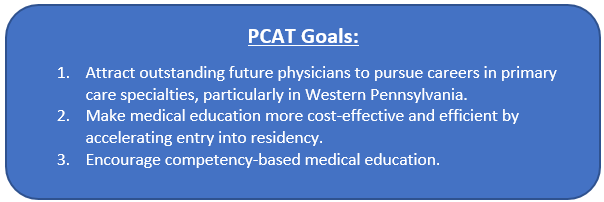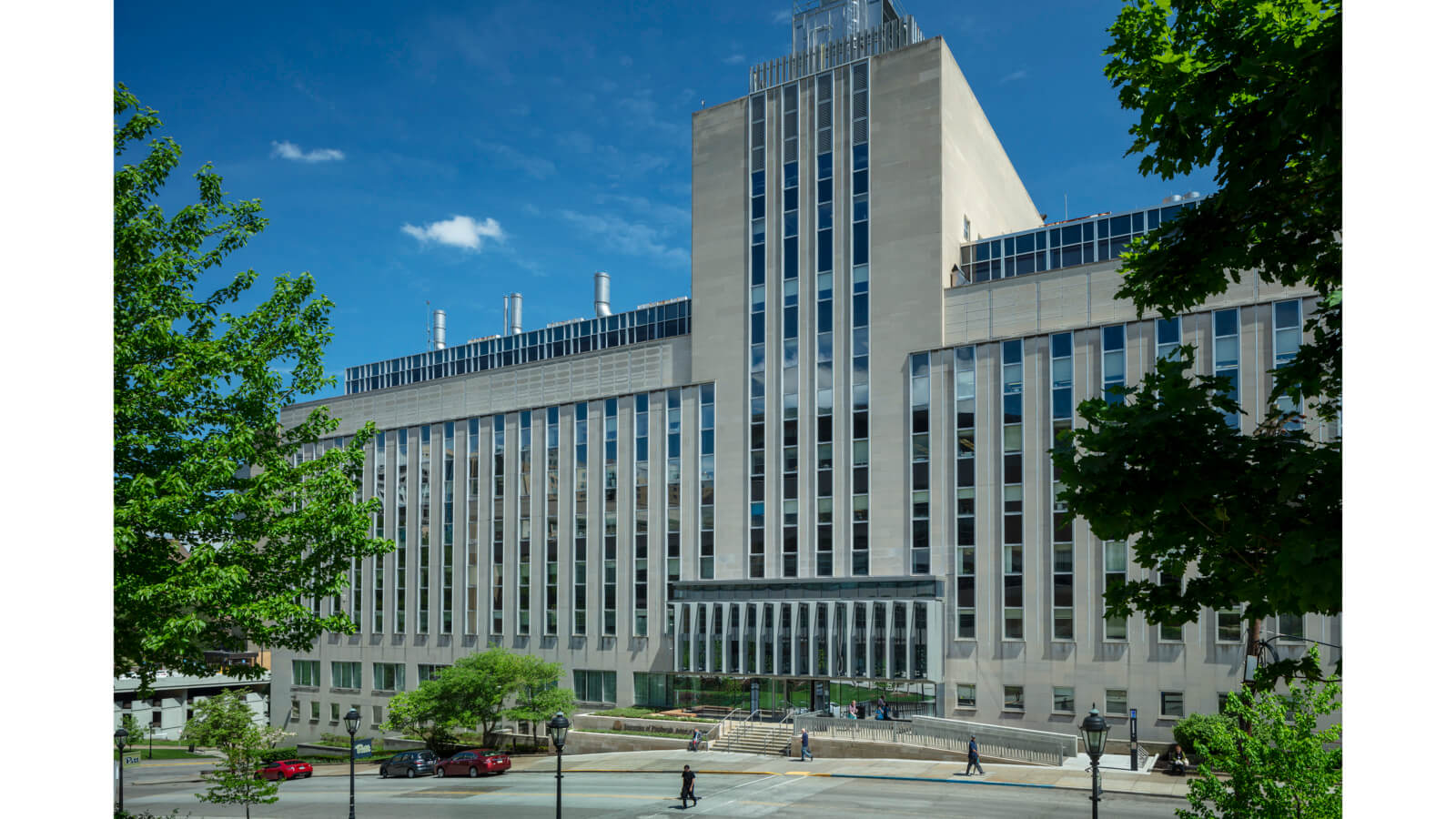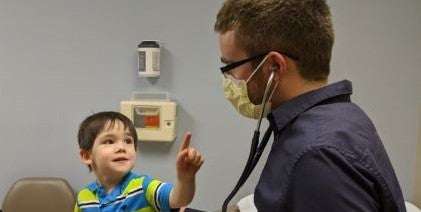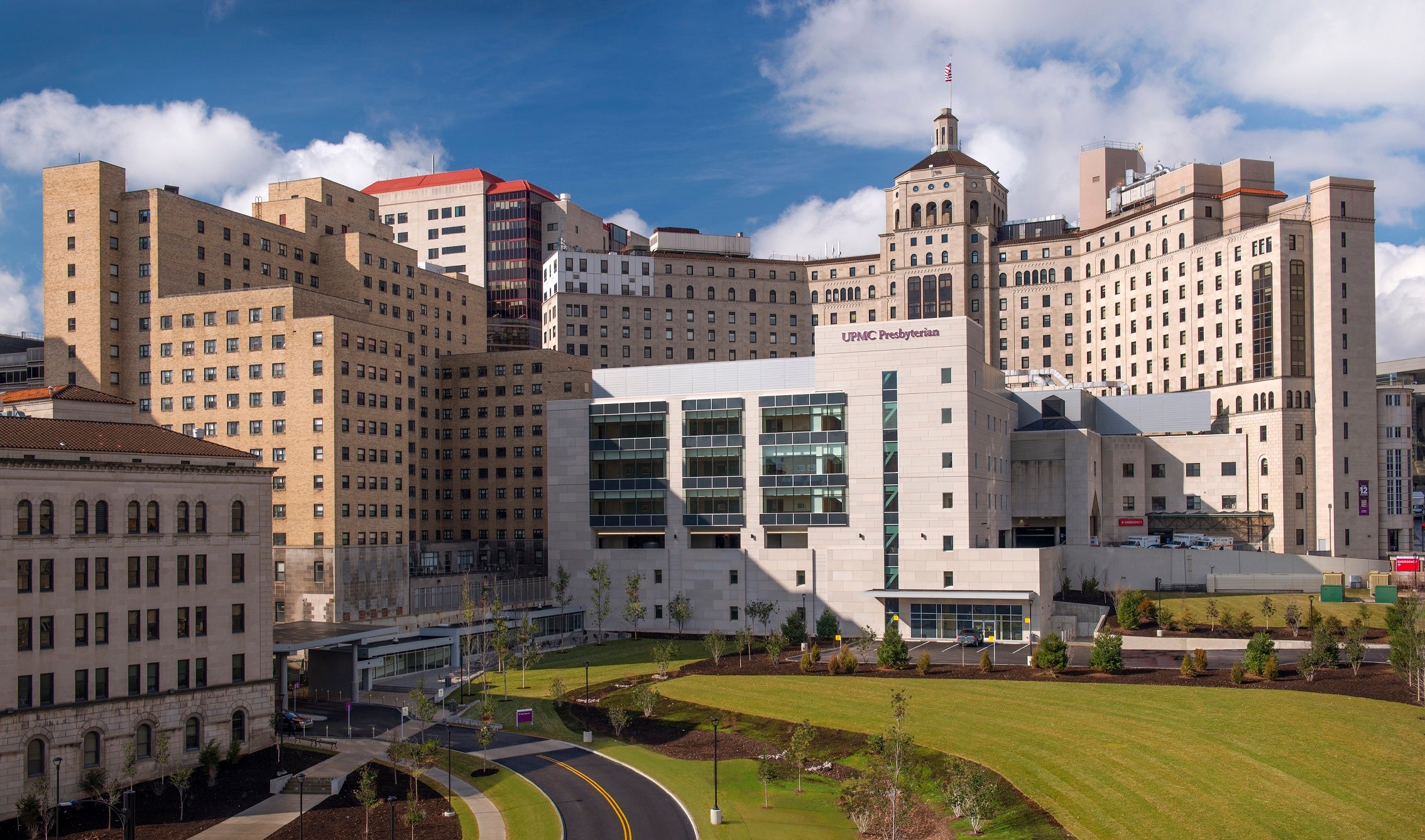Welcome to the PCAT homepage! PCAT is a joint program between the University of Pittsburgh School of Medicine (UPSOM) and UPMC Medical Education (residency programs). The program will begin with seven students matriculating in the fall of 2023, allowing accepted students to finish medical school in just three years, and be eligible to enter into one of UPMC’s primary care residency programs if all requirements are met, including clinical competence, USMLE success, and general maturation.

We’re looking for students who are eager and innovative, who are compassionate and skilled, who are committed to the primary care fields of pediatrics, family medicine, and internal medicine. These students will embark on a unique accelerated program enabling them to complete UPSOM in three years instead of the usual four, engaging with a curriculum modified for their unique needs, with supportive advising and mentorship that ties together undergraduate and graduate medical education programs. Students in PCAT who reach our milestones will be able, should they choose, to proceed to one of UPMC’s outstanding residency programs, where they will be ranked favorably—taking the pressure off of the residency selection process. But PCAT students retain autonomy of choice—they can drop out of PCAT at any time, pursue non-UPMC residencies if they wish, and ultimately practice wherever and however they wish.
On this page, we’ll share key aspects of the program. As with any new initiative, there may be changes that take place over time, but we are committed to a student-centered approach to education and will work with everyone to make this a successful approach to learning and career development.

What are the objectives of the program?
All students in PCAT are expected to complete the overall educational program objectives of the MD curriculum at UPSOM.
Overall, our objectives specifically for this program are to:
- Attract compassionate, dedicated, and skilled learners to UPSOM/UPMC
- Foster a culture emphasizing the value of primary care practice and care of those in low resource settings
- Help learners achieve higher levels of mastery in several key domains of the MD curriculum:
- Health systems science and interprofessional teamwork
- Community/population health and prevention
- Social medicine
- The doctor-patient relationship
- Communication skills
- Care for patients with chronic illness
- Leadership
- Encourage greater employment of competency-based medical education and individualized education trajectories in this pathway and ultimately for all learners in the MD curriculum
- Provide deeply meaningful patient relationships through the use of longitudinal patient panels
- Inspire greater linkages between undergraduate and graduate medical education at UPSOM, particularly around learner handoffs, curriculum development, and advising/mentorship
- Utilize best practices for mentorship, advising, and coaching for academic success and career development
- Assure the academic and professional success of every learner
- Retain learners throughout the course of the UME/GME journey, ultimately placing individuals in community practices locally if possible
How will students be chosen?
To be accepted into this competitive program, learners will have to demonstrate not only the usual UPSOM prerequisites (academic excellence, service/extracurricular, commitment to medicine, teamwork, leadership ability, and resilience), but also special qualities that predict success in primary care:
- Commitment to the specialty
- Long-term career plans
- Maturity
- Compassion/empathy
- Reflective ability
- Ability to form ongoing relationships
- Flexibility
- Interest in working with underserved communities
Diversity is a crucial goal for UPSOM/UPMC, and we will seek to admit a broad and representative group of learners into PCAT, particularly those interested in social justice and redressing inequities in health.
Students who seek admission into PCAT will proceed with the usual process for admission to UPSOM; if appropriate, they will be invited to submit a secondary application for PCAT, which will include a special essay and additional interviews as well as identification of the specialty track of interest (internal medicine, pediatrics, or family medicine). A final decision will be made with input from residency programs. Some students may achieve admission to UPSOM but not be admitted to PCAT.
Admitted students will be expected to commit by mid-May for a matriculation date of July 1, to allow them to begin the summer curriculum before the start of the traditional first year. Financial aid awards would only be expected to cover three years of the MD curriculum; this could be extended if a student ends up needing a fourth year outside PCAT.
What will the curriculum be like?
PCAT will allow enrolled students to complete the MD curriculum in three years before beginning residency. This acceleration will be accomplished by altering some of the requirements, adding important content to earlier phases (especially health systems and clinical work), and enhancing advising and assessment to allow for appropriate academic progression and career development. Key adaptations will include:
- One-month course on community health, clinical skills, and health care systems in July, preceding the start of the traditional first-year curriculum
- Flex week activities related to health systems science (teamwork, quality)
- Two-month course in the summer between first and second years, focusing on social medicine, longitudinal care, ethics, the EMR, and more
- Clinical continuity experiences running for all three years of the MD curriculum (weekly half-day experience at the site they will be doing their residency), with increasing responsibility starting with medical assistant functioning, moving towards interviewing, exams, and management
- Research experience, with a scholarly project focusing on health systems science, that could include summer research between first and second years
- Clerkship experiences at their future residency site, with some modifications of clerkship time based on specialty
Students will not be required to complete an Integrated Life Science course but must do an acting internship prior to residency.
Students will NOT be able to participate in PCAT at the same time as any other accelerated/combined program (e.g., MSTP, PSTP, or CSTP).
What does successful progression through the program look like?
All learners must remain in good standing to stay in PCAT, including:
- No academic observation (i.e., no course failures)
- Passage of USMLE (Steps 1 and 2CK) on first attempt
- Appropriate competency progression
- No major professionalism issues
- No leaves of absences (LOAs)
Students will be assessed regularly, with “off-ramps” annually for students who wish, or who fail to achieve these milestones. Any exceptions must be approved by the steering committee.
How will students be supported?
All students will have formal meetings with advisors and program leaders to monitor academic progress throughout the timeline. This will include specialty mentors, community practitioners, and senior students.
Students who have formal or informal needs for remediation or skill development will receive such services, depending on phase and needs.
What residency programs are participating?

| Internal Medicine | [2 spots at UPMC University Health Center site] |
| Pediatrics | [2 spots at UPMC Children’s Hospital of Pittsburgh site] |
| Family Medicine | [1 spot each at UPMC St Margaret, UPMC Shadyside, and UPMC McKeesport] |
These programs represent some of the top residencies in the nation in their respective specialties, with outstanding training available in multiple settings, to help prepare learners for primary care practice. These programs have amazing resources that will help trainees grow and develop into competent physicians who are also community-engaged health advocates and clinical leaders.
What will the residency selection process be like?
Students who meet PCAT milestones during the first three years will be ranked favorably by the UPMC residency program they have identified, making a direct progression to that program the goal. However, students can choose, if they wish, to interview at and select any other residency program in the country; they are not “forced” to rank a UPMC program if they decide not to. Non-UPMC residencies would still accept a three-year degree from UPSOM, although obviously our hope is that the “match” between PCAT learner and program will be strong enough that PCAT students would choose to remain in the UPMC system.
Students who do not meet PCAT milestones will still have time and opportunity to apply to residency programs of their choosing.

Will residency be different for PCAT learners?
Residencies will be similar for PCAT learners compared to others in the program. Learners should find it easier to adjust, given their familiarity with the progra m and region. All residents will receive appropriate bootcamp/orientation experiences; PCAT learners will meet with program leaders to individualize their residency experience based on interests and areas for development. Careful advising and mentorship will ensure program success.
What if a student changes their mind?
Students can ALWAYS change their minds. If they decide not to pursue the specialty they signed up for, they can simply drop out of PCAT and enter the regular four-year curriculum. If a student decides to pursue non-UPMC residencies, they can. If a student decides to subspecialize after residency, or practice outside of the Western Pennsylvania area, they can, without any obligations.
For more information about the program, contact Dr. Amanda Casagrande at casagrandeaj@upmc.edu
